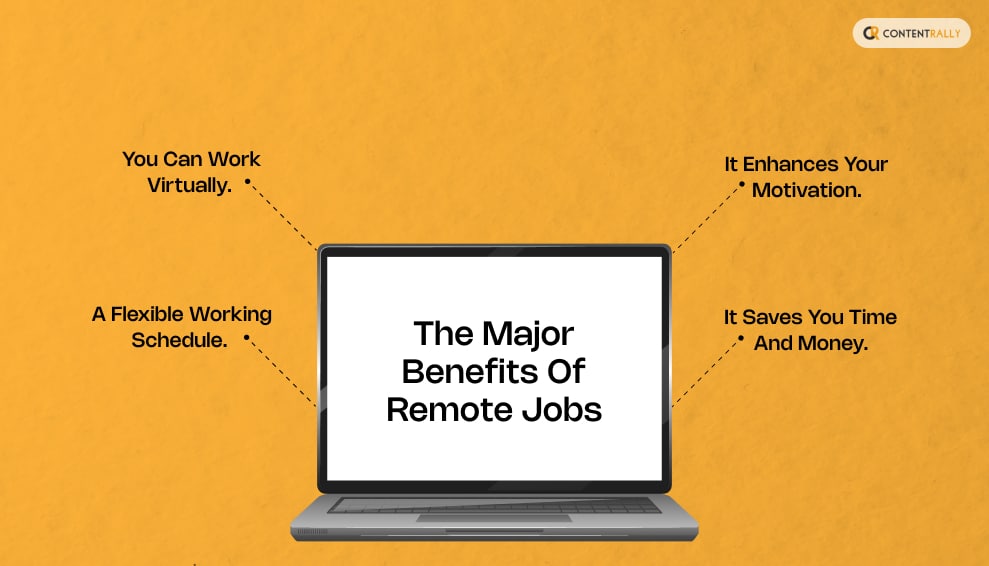There was a time when companies feared that remote work might affect healthy company culture and productivity. However, the pandemic made us realize that remote work can be a great work experience.
When it comes to remote work, companies allow employees and employers to control where, how, and when they want to work. Multiple studies have confirmed that it helps to establish a positive work environment.
Since 2020, remote work has become popular among all industries. We can observe that remote opportunities are all over the job boards. Some companies even describe themselves as fully remote.
But the real question is, what exactly is remote work, and how successful is it to work from a remote location?
Don’t worry, we have covered everything you must learn about remote work in this blog post. We will pay attention to the benefits and challenges of remote working. I will also discuss the recent remote job posts in high demand.
What Is a Remote Job?

In simple terms, remote jobs specifically talk about such work which does not require you to be physically present in the office space.
Previously, remote working was considered just the same as working from home. However, in recent years, the term has evolved. Now, remote working means working from anywhere other than the traditional work setting.
Whether working from a co-working space, your couch, or even a hotel room in another country, it is considered a remote job.
Ultimately, the main aim is to get the job done regardless of the location from which you are working. If you have your laptop or proper internet, you can work from wherever you want.
Remote working includes two specific types:
- Full remote. In this case, all the interactions take place on a virtual platform.
- Partial mode. This is also known as hybrid working. In case of partial more, the team splits up, and some of their employees work from multiple locations.
Most of the companies follow their definition of remote working. You can find the specifications on their job descriptions and websites. For example, a company may offer you remote work, but you may have to work while residing in a particular city.
Why Have Remote Jobs Become So Popular Lately?

The traditional 9 to 5 and 40 hours of week still exists in various companies. However, more companies are moving towards the remote working policy. As per the remote working policy, employees are free to choose whether they want to work from the office or from a remote location.
They get the opportunity to choose whatever suits them the best. Remote working has made a massive transformation in our way of working. It offers both flexibility and productivity in an organization. On top of that, it provides excellent access to the global talent pool.
The remote working process has helped redefine the overall company culture. It also helps to adopt new and advanced technologies. Alongside the benefits, remote working has become a central part of the professional landscape.
Thus, both employees and employers must adapt or instead embrace the opportunities and challenges it offers.
In such ways, the companies can combine remote working with their daily operation. This will further empower individuals as well as organizations to connect through the digital world.
The Major Benefits Of Remote Jobs

There are a lot of benefits to working as a remote worker. In this section, we will discuss the benefits of remote jobs and why they appeal to employers and employees.
You can work virtually
To learn about what a remote job is, it is necessary to understand the significant benefits that it offers. One of the most prominent benefits of remote jobs offer is that you can work from anywhere . You just need to have better internet access.
While working as a remote worker, you can choose your location. It can be a cafe or your own house. You can also work when you are traveling. You have a good internet connection, a well-functioning computer setup, and the time to complete the allocated tasks.
However, some companies have specific rules and regulations regarding location. It would be helpful to understand the company policies regarding remote working.
A flexible working schedule
Remote working offers you a flexible working schedule. Suppose you are mostly productive during the early morning hours. In such cases, you choose the morning shift and tailor your working schedule accordingly.
Remote working allows you to seize the opportunity and choose flexible working hours, leading to great productivity.
It enhances your motivation
Remote working helps you decrease additional distractions from your co-workers, further increasing your motivation. Additionally, it allows you to develop good habits. You also start following best practices that can help you to optimize your day-to-day activities.
It saves you time and money
When working as a remote worker, you can quickly minimize the time you spend commuting. It also helps you to save money on gas or maintaining your car.
Moreover, you can invest less in working clothes or the meals you have outside. As a result, you can keep a proper balance between work and personal life while saving money.
Are There Any Challenges?

While remote working has a lot of benefits to offer, there are a lot of challenges that you might face while working as a remote worker. But that doesn’t mean that you cannot avoid the obstacles.
You need to have proper planning to overcome the challenges. In this section, we will discuss the significant challenges of remote working.
Long working hours
There can be instances where you may have to work longer than your usual shift timing. As we have learned, remote working promotes flexible working hours. Thus, you must ensure you are logging off right on time.
Consider setting an alarm to help you stay updated about your working hours.
Complexity in establishing communication
When working as a remote worker, you communicate with your co-workers virtually. This can lead to a massive communication gap.
If you feel like such things are happening, consider talking to your manager and scheduling a meeting. This can help you to speak to everyone directly and further resolve the communication issue.
Massive workload
As a remote worker, you are more productive than in an office setting. This can lead to an increased workload. In such cases, do not hesitate to speak to your manager about it. Let the management know about the excessive responsibilities.
The manager can help you to rearrange all your priorities. This can help you to maintain a manageable workload.
What Are The Different Types Of Remote Jobs Available In The Job Market?

Remote working frees you from a 9 to 5 desk job just to complete some meaningful work. In 2024, a lot of industries and companies prefer to provide remote jobs.
In this section, I have provided you with a list of remote work available in the job market.
The industries that are preferring remotes working in 2024:
- Computer and IT industry
- HR and recruitment
- Customer service
- Medical and health industry
- Accounting and finance industry
- Marketing
- Project management
The top and most common remote jobs of 2024:
- Accountant
- Front and back-end developer
- Content writer
- Marketing executives
- Financial analysts
- Product marketing managers ‘
- Brand managers
- Customer service representative
- Graphic designer
- HR recruiter
- Technical writer
- Project manager
Can I Do Work From Home?

Is the remote job the one for you? Remote jobs may be an ideal deal for all employees. Imagine taking frequent breaks, balancing your work and personal life, and working in a flexible shift- who doesn’t want it?
Even if remote work is ideal for all, practically, only some are perfect fit for remote work. There are many cases where the employees felt left out, isolated, and lonely. As a result, it had a significant impact on their productivity.
But you can still try to determine whether it is ideal. Firstly, you can start working as a remote worker and try it. See if it works out for you or not.
Secondly, you can ask yourself whether you will be motivated to work even when your supervisor is not around! Are you going to feel isolated, or if remote working can actually increase your productivity?
Asking such questions yourself can help you get a proper idea about it.
This article has been helpful for you in understanding what a remote job is and everything you must know about remote working. , don’t forget to stay connected with us for more blogs and articles.
Read Also:
- 5 Of the Highest Paid Remote Jobs
- 10 Work From Home Jobs For Moms And Dads






















